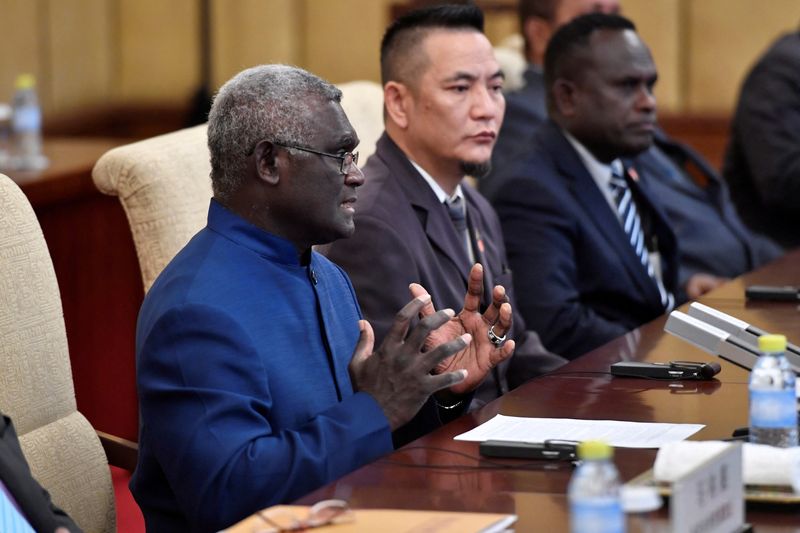(Corrects paragraph 17 to show Solomon Islands recognised Beijing, not Taiwan)
By Kirsty Needham
SYDNEY (Reuters) -Months after the Solomon Islands struck a security pact with China, its leader has repeatedly appeared to snub the United States, heightening Washington's concern but not deterring it from trying to keep the Pacific nation out of Beijing's orbit.
Prime Minister Manasseh Sogavare's unpredictable diplomacy will make it hard for the United States to make up lost ground with the pivotal island nation as China seeks to expand its security presence, former diplomats and other analysts say.
As part of a push to boost engagement and counter China's growing influence, the administration of President Joe Biden plans to open an embassy for the first time in three decades in the Solomon Islands, an archipelago that switched diplomatic recognition from Taiwan to Beijing in 2019 and in April sealed the security agreement with China.
Washington has since faced a series of rebuffs from Sogavare, who continues to keep dialogue open on U.S. aid.
Last month he skipped a planned appearance with a senior U.S. official at a World War Two commemoration. His government did not respond to a U.S. Coast Guard vessel's request to refuel, a move Washington called "regrettable". Sogavare then announced he was barring all foreign navy ships from port - while he was welcoming a U.S. Navy hospital ship on a humanitarian mission.
China's state-owned Global Times newspaper said in an editorial that the prime minister was "counteracting" against Washington.
The U.S. State Department declined to comment. A spokesperson for Senator Marsha Blackburn, who last week visited Sogavare, said it was "extremely concerning that Solomon Islands are blocking military vessels from their waters".
Sogavare has a history of erratic behaviour, which contributed to him previously losing office as prime minister, said Australian National University Pacific expert Graeme Smith.
Michael Green, a former senior U.S. national security official, said the halt to navy visits is a "net loss" for the United States, which had access before the deal with China, but it does not mean "the game is over".
"We also don't know whether Prime Minister Sogavare is paralysed with indecision given the tough geopolitics - or in the pocket of Beijing - or both," said Green, who heads the United States Studies Centre at the University of Sydney. "Either way, the U.S. and Australia have to keep at engagement and prove we are trusted partners."
Sogavare's office did not immediately respond to a request for comment.
'PRESSURED FROM ALL SIDES'
Sogavare is pushing back against pro-democracy messaging from Washington to avoid being a pawn in a superpower contest, said Mihai Sora, an Australian former diplomat in the Solomon Islands. "Particularly to Sogavare, it is antagonising."
His abrupt absence from the 80th anniversary commemoration of the Battle of Guadalcanal played into China's goals of keeping U.S. influence at bay, said Sora, a research fellow at Australia's Lowy Institute think tank.
"Of all the Pacific islands leaders, Sogavare is the one that is most accommodating to China's strategic intent," he said.
Washington had little engagement with the Solomon Islands before Honiara sealed the pact with China and has a lot of diplomatic ground to make up, Sora said.
Catherine Egbert-Gray, who frequently met Sogavare when she was U.S. ambassador to the Solomon Islands, said China's assertive diplomacy only reinforces the U.S. decision to increase development assistance and reopen its embassy in Honiara.
Around the time Sogavare recognised Beijing, "he appeared confident he could maintain good and strong relations with all diplomatic partners," she said. "I hope he remains committed to this goal and does not allow unsavoury influences to break down long-held friendships to the long-term detriment of the nation."

James Batley, who from 2004 to 2006 led the Regional Assistance Mission to Solomon Islands, an international security response to violent clashes there, said Honiara's foreign navy moratorium likely also applies to Chinese vessels.
"It is a way of buying them breathing space," he said. "I do think they feel pressured from all sides".